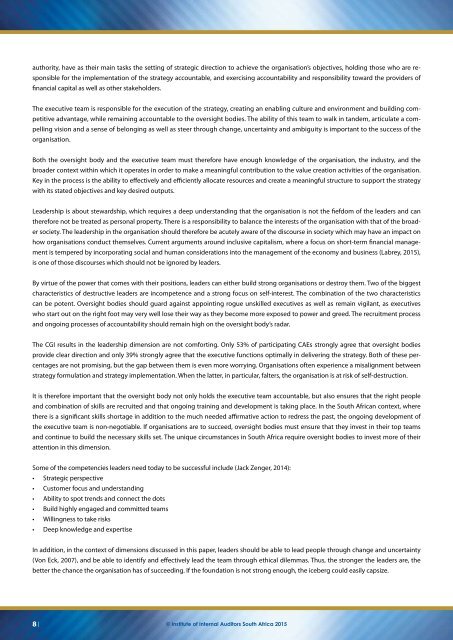INTEGRATED REPORTING TIP OF THE ICEBERG
Integrated_Reporting_Tip_of_the__Iceberg
Integrated_Reporting_Tip_of_the__Iceberg
You also want an ePaper? Increase the reach of your titles
YUMPU automatically turns print PDFs into web optimized ePapers that Google loves.
authority, have as their main tasks the setting of strategic direction to achieve the organisation’s objectives, holding those who are responsible<br />
for the implementation of the strategy accountable, and exercising accountability and responsibility toward the providers of<br />
financial capital as well as other stakeholders.<br />
The executive team is responsible for the execution of the strategy, creating an enabling culture and environment and building competitive<br />
advantage, while remaining accountable to the oversight bodies. The ability of this team to walk in tandem, articulate a compelling<br />
vision and a sense of belonging as well as steer through change, uncertainty and ambiguity is important to the success of the<br />
organisation.<br />
Both the oversight body and the executive team must therefore have enough knowledge of the organisation, the industry, and the<br />
broader context within which it operates in order to make a meaningful contribution to the value creation activities of the organisation.<br />
Key in the process is the ability to effectively and efficiently allocate resources and create a meaningful structure to support the strategy<br />
with its stated objectives and key desired outputs.<br />
Leadership is about stewardship, which requires a deep understanding that the organisation is not the fiefdom of the leaders and can<br />
therefore not be treated as personal property. There is a responsibility to balance the interests of the organisation with that of the broader<br />
society. The leadership in the organisation should therefore be acutely aware of the discourse in society which may have an impact on<br />
how organisations conduct themselves. Current arguments around inclusive capitalism, where a focus on short-term financial management<br />
is tempered by incorporating social and human considerations into the management of the economy and business (Labrey, 2015),<br />
is one of those discourses which should not be ignored by leaders.<br />
By virtue of the power that comes with their positions, leaders can either build strong organisations or destroy them. Two of the biggest<br />
characteristics of destructive leaders are incompetence and a strong focus on self-interest. The combination of the two characteristics<br />
can be potent. Oversight bodies should guard against appointing rogue unskilled executives as well as remain vigilant, as executives<br />
who start out on the right foot may very well lose their way as they become more exposed to power and greed. The recruitment process<br />
and ongoing processes of accountability should remain high on the oversight body’s radar.<br />
The CGI results in the leadership dimension are not comforting. Only 53% of participating CAEs strongly agree that oversight bodies<br />
provide clear direction and only 39% strongly agree that the executive functions optimally in delivering the strategy. Both of these percentages<br />
are not promising, but the gap between them is even more worrying. Organisations often experience a misalignment between<br />
strategy formulation and strategy implementation. When the latter, in particular, falters, the organisation is at risk of self-destruction.<br />
It is therefore important that the oversight body not only holds the executive team accountable, but also ensures that the right people<br />
and combination of skills are recruited and that ongoing training and development is taking place. In the South African context, where<br />
there is a significant skills shortage in addition to the much needed affirmative action to redress the past, the ongoing development of<br />
the executive team is non-negotiable. If organisations are to succeed, oversight bodies must ensure that they invest in their top teams<br />
and continue to build the necessary skills set. The unique circumstances in South Africa require oversight bodies to invest more of their<br />
attention in this dimension.<br />
Some of the competencies leaders need today to be successful include (Jack Zenger, 2014):<br />
• Strategic perspective<br />
• Customer focus and understanding<br />
• Ability to spot trends and connect the dots<br />
• Build highly engaged and committed teams<br />
• Willingness to take risks<br />
• Deep knowledge and expertise<br />
In addition, in the context of dimensions discussed in this paper, leaders should be able to lead people through change and uncertainty<br />
(Von Eck, 2007), and be able to identify and effectively lead the team through ethical dilemmas. Thus, the stronger the leaders are, the<br />
better the chance the organisation has of succeeding. If the foundation is not strong enough, the iceberg could easily capsize.<br />
8 | © Institute of Internal Auditors South Africa 2015



